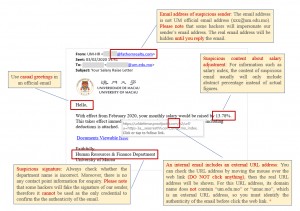Information Security Tips (June 2021) – How to protect your data while travelling?
The University campus is equipped with a trusted Wi-Fi network to keep your data safe, but when you travel off campus for vacation, academic field trips, or a study session at a public venue, please take extra precautions on using public Wi-Fi as hackers and other cybercriminals like to take the advantage of public locations with less security protection to contact cyberattack.
Please take note of the below tips to keep your data safe when using public Wi-Fi:
-
- Verify the network, configure and turn off sharing function
- Use a virtual private network (VPN)
- Use links with HTTPS
- Keep the firewall enabled
- Use antivirus software
- Always turn off automatic connection
- Always use two-factor authentication (2FA) – In this way, even if a hacker obtains your username and password, they still cannot be able to access your accounts.
If possible, it is better to use the network of your mobile device as a hotspot instead of using the insecure public Wi-Fi.




